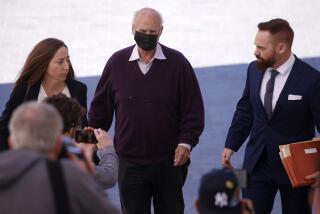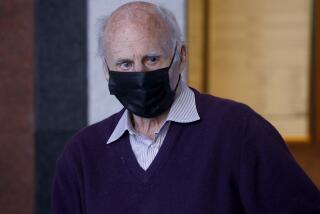Dominelli Is Able to Stand Trial, U.S. Judge Will Be Told
- Share via
A federal court judge will be told this afternoon that J. David (Jerry) Dominelli is competent to stand trial on a 25-count federal grand jury indictment charging him with perjury and fraud in connection with the bankruptcy of his J. David & Co. investment firm.
That is the assessment of attorneys and others familiar with the case.
After hearing the competency evidence--which will include reports from two court-appointed psychiatrists--U.S. District Judge William B. Enright will decide either to set a trial date for the 43-year-old Dominelli or to hold him in federal custody until he is competent.
Ironically, Enright’s ruling will be made one year to the day after Dominelli’s first jail stint--10 hours in federal custody for failing to cooperate with the court-appointed J. David bankruptcy trustee.
Two court-appointed psychiatrists, Dr. Mark A. Kalish and Dr. Murray R. Rosenthal, submitted their reports to Enright last week.
Each psychiatrist first examined Dominelli in November, about one month after the jailed financier suffered a stroke that left him partly paralyzed and virtually unable to communicate.
At that time, the two psychiatrists disagreed about Dominelli’s condition: Kalish said that Dominelli was “marginally competent” to stand trial, while Rosenthal opined that he was “marginally incompetent.”
Since then, however, Dominelli has substantially recovered from his stroke, although his writing abilities remain impaired and he is able to speak only in short phrases, according to sources close to the case.
Dominelli receives speech therapy five times per week, and often communicates with a hand-held, electronic communicator, which acts much like a miniature typewriter, printing out whatever Dominelli types.
“He could testify in court, although a jury might not understand him,” said one source familiar with Dominelli’s health. “The ability to understand him is far less for someone who doesn’t know him.”
Dominelli, who suffers from congenital hearing losses in both ears, still is not using a hearing aid, according to the source. In addition, Dominelli has not worn a hearing aid in any of his numerous court appearances, despite an order by Enright last November that he do so.
The government likely will push for Dominelli to be judged competent to stand trial.
“In November we argued he was competent, and he has improved considerably since then,” according to Assistant U.S. Atty. Robert D. Rose, who has led the federal grand jury probe of Dominelli and his fallen La Jolla investment firm.
It is unknown how D. Gilbert Athay, Dominelli’s criminal attorney, will respond to the government’s request that Dominelli be found competent. Athay, who is based in Utah and who has spent little time in San Diego, could not be reached for comment.
However, Dominelli’s attorney in state court said that he might ask Superior Court officials to analyze Dominelli’s competency from a different perspective.
“Whether or not he is competent in the traditional legal sense might not be the whole story,” said Robert L. Grimes, who represents Dominelli on state charges that he illegally funneled funds into Mayor Roger Hedgecock’s 1983 campaign. “Traditionally, competence deals with sanity. But in this case, the main problem is communication; his ability to speak is very impaired.”
Also effected by Dominelli’s competency hearing is local contractor Parin Columna, a former J. David & Co. employee who was indicted with Dominelli on eight counts of fraud and aiding and abetting.
It remains uncertain whether Columna will ask for his case to be severed from Dominelli’s. Michael J. McCabe, Columna’s attorney, has said in the past that he expects Dominelli to testify in Columna’s behalf, which would make separate trials a likelihood. “But if Dominelli isn’t competent to stand trial, then he isn’t competent to testify either,” said McCabe.
McCabe has asked Enright to dismiss the charges against Columna on the grounds of discriminatory prosecution. To substantiate his claims, McCabe filed with the court a 10-page summary of federal grand jury evidence that surfaced as part of his legal discovery process.
The grand jury summary reveals for the first time some of the government’s evidence of potential bankruptcy fraud in the days immediately preceding and following the Feb. 13, 1984, involuntary bankruptcy of J. David.
One summary, for example, says that Robert Harlan, once Dominelli’s attorney, sold a 1983 Mercedes Benz 380 SEL on Feb. 11, 1984, and received in return a $35,000 check made payable to himself. On Feb. 14, Harlan’s wife, Julie, sold a 1980 Rolls Royce belonging to J. David & Co. for $53,500, according to the documents. The check was made payable to J. David & Co. and to Robert Harlan.
Prior to these transactions, the document said, Harlan met with Arthur Axelrod and his attorneys and threatened to move the entire J. David operation overseas if Axelrod forced Dominelli in bankruptcy, which he eventually did.
More to Read
Sign up for Essential California
The most important California stories and recommendations in your inbox every morning.
You may occasionally receive promotional content from the Los Angeles Times.












